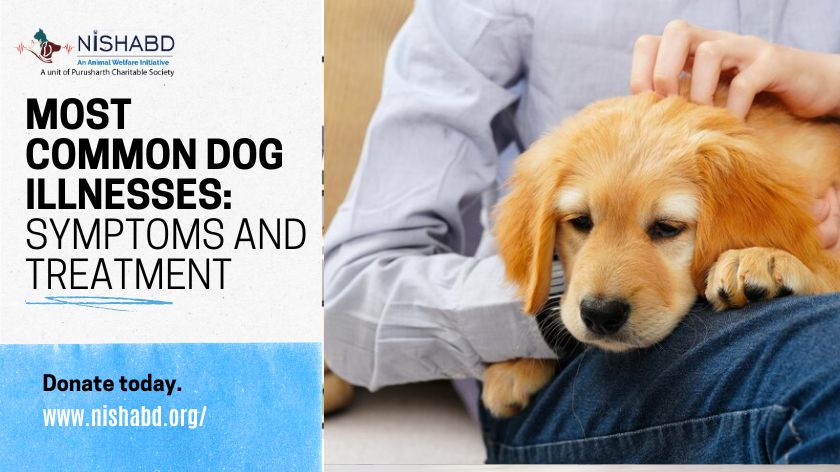Most Common Dog Illnesses: Symptoms and Treatment
Dogs are adored individuals of our families, not just house pets. Therefore, as responsible animal people we genuinely must be educated about any medical issues that could affect them when they emerge – from parasite diseases to viral contaminations – to guarantee our furry partners carry on with blissful and sound lives.
In this blog entry we’ll talk about a few of the most predominant dog illnesses alongside tips on recognizing signs and making an appropriate move. Prevention is the key with regards to keeping our furry companions happy and sound! By expecting normal dog diseases and their treatment techniques, we can safeguard the well being and happiness of our little friends.
Some diseases with Sympotoms and Treatment
- Canine Parvovirus (Parvo): An exceptionally infectious viral sickness basically influences puppies and unvaccinated dogs. It attacks the gastrointestinal tract, causing extreme vomiting, diarrhea (often bloody), dehydration, and possibly fatal results whenever left untreated. Immunization and brief veterinary consideration are fundamental for prevention and treatment.
Symptoms: Lethargy, vomiting, diarrhea (often bloody), and dehydration are among the symptoms.
Treatment: Typically, it requires constant treatment with intravenous fluids, antibiotics, and prescription anti-nausea medications. - Canine Distemper: Canine distemper is a contagious viral infection that affects the digestive, respiratory, and sensory systems of dogs. Direct contact with diseased animals or their bodily fluids is how it spreads.
Symptoms: They incorporate fever, nasal discharge, coughing, vomiting, diarrhea, seizures, and paralysis.
Treatment: There is no particular treatment for sickness, so prevention through vaccination is significant. - Kennel Cough: Kennel Cough: Also known as infectious tracheobronchitis, kennel cough is a highly contagious respiratory illness that is typically observed in dogs that live in close quarters, such as shelters or kennels. It is characterized by a chronic dry cough and gagging and is brought on by a range of viruses and bacteria.
Symptoms: The symptoms of this disease may include Gagging, nasal discharge, and a chronic dry cough are among the symptoms.
Treatment: Cough suppressants and antibiotics may be part of the treatment. - Lyme Infection: Lyme Sickness is a bacterial contamination transmitted through the bite of tainted ticks. Early discovery and treatment are urgent to forestall complexities, including kidney and heart issues, in impacted dogs.
Symptoms: Symptoms in dogs can fluctuate however may incorporate faltering, joint expanding, fever, dormancy, and loss of craving.
Treatment: It commonly includes antibiotics and steady care. - Canine Heartworm Infection: Canine Heartworm Infection is a serious and possibly lethal condition brought about by parasitic worms communicated through mosquito bites. The worms, known as heartworms, infect the heart, lungs, and veins of affected dogs. Prevention through standard heartworm counteraction prescription is fundamental.
Symptoms: They might include coughing, exercise intolerance, fatigue, and weight loss.
Treatment: It includes medications to kill the heartworms, alongside severe rest and exercise limitations. - Ear Illness: They encompass a range of conditions influencing the ears, from infections to sensitivities and structural abnormalities. These illnesses can affect dogs of all varieties and ages and may change in seriousness. While the side effects and medicines for specific ear sicknesses vary, it’s fundamental for pet owners to know about the indications of ear issues and look for veterinary consideration if they suspect their dog is experiencing any issues.
Symptoms: Indications of an ear contamination in dogs incorporate shaking or shifting of the head, scratching or rubbing the ears more than expected, a terrible stench coming from the ears, redness or expanding in the ear waterway.
Treatment: Treatment for ear diseases ordinarily includes veterinary consideration, including ear cleaning, anti-toxin remedy, and medicine to diminish enlarging, with follow-up arrangements vital for complete recuperation. - Dogs’ skin allergies: Skin allergies, also referred to as allergic dermatitis, are a common condition in dogs. These allergies can be brought on by a variety of factors, including food allergies, mold, pollen, and dust mites, as well as flea bites. Skin allergies can affect dogs of any age or breed, while certain breeds may be more susceptible to particular types of allergies than others.
Symptoms: Dogs with skin allergies may exhibit excessive scratching, redness, irritation, or even hair loss. It’s possible that your dog is scratching or licking their skin more often than usual. In severe cases, continuous scratching may result in thicker skin or the formation of sores and scabs.
Treatment: Antihistamines, steroids, and medicated shampoos are among the available treatment options for symptom relief and inflammation reduction.
In cases of food allergies, a customized diet may be necessary.
Conclusion:
All in all, being knowledgeable about the most widely recognized dog illnesses and dog illnesses symptoms are essential for every pet person. We can offer quick and effective help for our animal buddies by recognizing the signs and appreciating the accessible treatment choices. Immunizations, routine veterinary check ups, and preventive measures like tick and bug management are fundamental for keeping up with our dogs’ wellbeing and prosperity.
Furthermore, keeping up with proper hygiene and providing a healthy diet can help their immune systems and lower the probability of disease. Keep in mind, our canines depend on us for their care and well being. We can give them the best possible personal fulfillment by continuing to learn and take initiative.
How about we keep on focusing on our pets’ well being and guarantee they get the affection, care, and consideration they deserve. Together, we can keep our furry friends lively, strong, and flourishing from now onward, indefinitely.
Read our Article: Barking Up the Right Tree: A Guide to Tackling Allergies in Dogs

